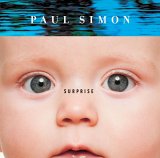Paul's colaboration with Brian Eno

Surprise - 2006
Let’s discard our surprise over why rock’s most infamous mild-voiced pseudo-intellectual would choose rock’s most infamous mild-voiced pseudo-aesthete as his newest collaborator. Ever since he realized that Art Garfunkel’s perfectly boring pipes imbued his pensées with a crippling solemnity, Paul Simon has hopped from textural bed to textural bed, never sticking around long enough to say thank you to Dixieland, mbaqanga, Nile Rodgers-Bernard Edwards, and Brazilian percussion. Besides, isn’t this what ‘70s singer-songwriters do when bored with acoustic guitars? Ask Joni Mitchell, Jackson Browne, and Neil Young. Call it 50 Ways to Leave the Straitjacket of American Rhythms.
I suspect that the wary are more concerned about Brian Eno’s name on the credits anyway. Sure, they’re both fat and balding, but what’s His Holiness doing with such an icon of middlebrow sophistication? The same thing he did with David Bowie, Ultravox, and U2 (and, lest we forget, James): remind middlebrows with highbrow aspirations that their business is writing good songs, while his is to let these good songs float in a sea of permutation. The trouble is, the seas have been calm for years; these days Eno the highbrow parvenu is more comfortable at the lectern. Thus, a collaboration with Paul Simon makes sense: put two artists who’ve been boring for years together and you get enviable symmetry, as delicious in its way as David Byrne-Brian Eno—with better hair.
Surprise sounds a lot like 1983’s Hearts & Bones, Simon’s first commercial bomb, forgotten when Chevy Chase sold Graceland to the MTV generation a couple of years later. A funny thing, though: nowadays everyone seems to own a copy of Hearts & Bones, making it his most overrated album. H&B is dense, quiet, and insular, so cheerful in its narcissism, so maladroit in its yearning to be cool (check out Simon’s shirt on the cover: New Wave!). Gauche too: playing a Syclavier like an electric piano won’t turn you into Suicide. Surprise commits no such missteps. It’s almost as good as H&B, and likely to be as undervalued, but don’t worry: give it 20 years and its cadenced ruminations and instantly dated production will get some love from the usual suspects.
The processed guitars of “How Can You Live in the Northeast?” begin the album with a convincing clang, while the lyrics just clang: “If the answer is infinite light / Why do we sleep in the dark?” This and “Wartime Prayers,” an attempt at 9-11 come-on-up-fer-a-rising, yearn for a metaphysical uplift which Simon’s pedantic humanism can’t summon. Fortunately Simon devotes most of Surprise to his two favorite subjects—Paul Simon and Guys Who Act Like Paul Simon—with most of his considerable acuity. We learn what tears are made of in the fragile “Sure Don’t Feel Like Love”; the schmuck in “Outrageous” with dyed hair the color of mud wonders, “Who’s gonna love you when your looks are gone?” Throughout Eno keeps his trademark whoops and bleeps under control, although his idea of sonic innovation these days is to emulate William Orbit circa 1998, or to filter Simon’s powdery voice.
Two exceptions dramatize the quandary facing a musician whose ambitions collide with a sixtysomething’s natural inclination to cling fiercely to old verities. It’s no coincidence that both songs are about children (perhaps grandparents are nicer to kids because they’re one stroke away from reverting to children themselves). The horrible “Beautiful” revives the colonialist canards first raised upon the release of Graceland, as the smug protagonist extols his Bengali and Kosovar babies, beating the redoubtable Angelina Jolie at her own game. “Father and Daughter” is sweeter: a basic bass-drums groove with a lovely East African electric guitar motif that evokes the pathos and mystery of the relationship as subtly as the lines, “There's nothing scary hiding under your bed / I’m gonna stand guard / Like a postcard of a Golden Retriever.” Fittingly, Eno is nowhere to be seen on this track. Middlebrow art that transcends itself doesn’t need another middlebrow muscling in.